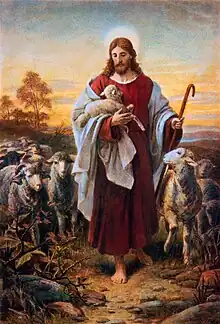Fourth Sunday of Easter
The Fourth Sunday of Easter is the day that occurs three weeks after the Christian celebration of Easter.
Western Christianity
Tridentine Catholicism (pre-1970)

In the historical Roman Rite of the Catholic Church, this day was officially known as the Third Sunday after Easter. It was also nicknamed Jubilate Sunday due to the incipit ("Iubilate Deo") of the introit assigned to this day.[1] The full text of the introit in its original Latin was: "Iubilate Deo, omnis terra, allelúia: psalmum dícite nómini eius, allelúia, allelúia, allelúia. Dícite Deo, quam terribília sunt ópera tua, Dómine! in multitúdine virtútis tuæ mentiéntur tibi inimíci tui."[2] This introit is based on Psalm 65:1–3 (which is now more commonly called Psalm 66 in accord with the Hebrew numbering used in modern Bibles).
For a brief period of time (1847–1911), this Sunday was also celebrated as the Solemnity of St. Joseph, Patron of the Universal Church. In 1911, this feast day was moved to the following Wednesday, where it remained until it was suppressed altogether in 1955.[3]
Post-Vatican II Catholicism (1970–present)

In the 1970 revision of the Roman Missal, this day was designated the "Fourth Sunday of Easter," and the "Iubilate Deo" introit for this Sunday was swapped with that of the preceding Sunday.[4] The preceding Sunday's Gospel reading was likewise moved forward to this day. Because this Gospel reading is the parable of the Good Shepherd, the Fourth Sunday of Easter is now also known as Good Shepherd Sunday (a name formerly given to the Third Sunday of Easter to which the reading was originally assigned).
In 1964, Pope Paul VI established a World Day of Prayer for Vocations[5] to coincide with Good Shepherd Sunday,[6] now celebrated on the Fourth Sunday of Easter. For this reason, this day is also known in the Catholic Church as Vocations Sunday.[7] The Church of England also celebrates Vocations Sunday on this day.[8]
Lutheranism
Johann Sebastian Bach composed three church cantatas for the Lutheran celebration of Jubilate Sunday. These cantatas incorporated the readings traditionally prescribed for this day: the epistle (1 Peter 2:11–19) and the Gospel (John 16:16–22).
- Weinen, Klagen, Sorgen, Zagen, BWV 12, April 22, 1714
- Ihr werdet weinen und heulen, BWV 103, April 22, 1725
- Wir müssen durch viel Trübsal, BWV 146, May 12, 1726, or April 18, 1728
In the Revised Common Lectionary currently used by many Lutherans, the Gospel reading is the Good Shepherd passage.
Eastern Christianity
In the Greek Orthodox Church, this day is called the Fourth Sunday of Holy Pascha, and is also called the Sunday of the Paralytic due to the Gospel passage (John 5:1–15) read on this day.[9][1]
See also
References
-
 Holweck, Frederick (1913). "Paschal Tide". In Herbermann, Charles (ed.). Catholic Encyclopedia. New York: Robert Appleton Company. Retrieved April 10, 2021.
Holweck, Frederick (1913). "Paschal Tide". In Herbermann, Charles (ed.). Catholic Encyclopedia. New York: Robert Appleton Company. Retrieved April 10, 2021. - Missale Romanum [Roman Missal] (in Latin) (5th post-typical ed.). Priestly Fraternity of Saint Peter. 2012 [1960]. p. 262.
- DiPippo, Gregory (April 13, 2016). "The Solemnity of St Joseph, Patron of the Universal Church 2016". Retrieved April 11, 2021.
- Missale Romanum [Roman Missal] (in Latin) (3rd revised ed.). Midwest Theological Forum. 2015. pp. 322, 329.
- "Paul VI: Institution of the 'World Day of Prayer for Vocations'". Vatican Radio. April 20, 2013. Archived from the original on September 15, 2017.
- Pope Paul VI (April 11, 1964). "Radiomessagio del Papa Paolo VI per la giornata mondiale delle vocazioni" (in Italian). Holy See. Retrieved April 10, 2021.
- O'Kane, Lydia (May 3, 2020). "Vocations Sunday: The courage to say yes to God's call". Vatican News. Retrieved April 10, 2021.
- "Growing vocations everywhere". Church of England. Retrieved April 10, 2021.
- "Sunday Of The Paralytic". Greek Orthodox Archdiocese of America. Retrieved April 10, 2021.
